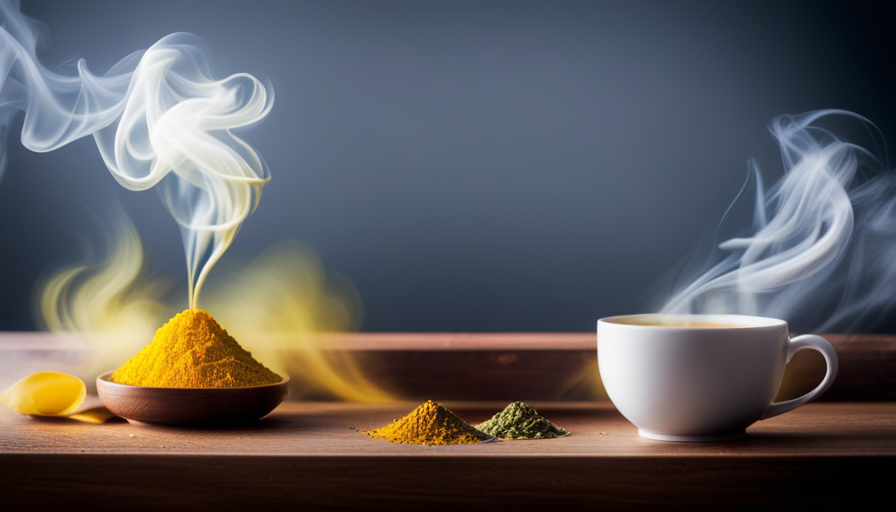Intermittent fasting has gained popularity in recent years because of its potential health benefits. This eating pattern involves alternating between periods of eating and fasting in order to promote weight loss and enhance metabolic health.
However, when it comes to fasting, many people are unsure about what they can consume without breaking their fast. Two popular ingredients that people often wonder about are turmeric and ginger. These spices have long been used for their medicinal properties and are often added to food and drinks for their flavor and health benefits.
But can consuming turmeric and ginger break your fast? In this article, we’ll explore the health benefits of these spices, whether or not they break a fast, and how to incorporate them into your fasting routine.
Key Takeaways
- Turmeric and ginger are popular ingredients during fasting and have powerful anti-inflammatory and antioxidant properties.
- They are generally safe in food amounts and minimal effect on insulin response, making it unlikely to break a fast.
- Both spices can aid in weight loss, improve skin health, and protect against chronic diseases.
- Mindful spice combinations can enhance the flavor of meals while still reaping benefits of fast, and cinnamon or cumin may have positive effects on blood sugar levels and fasting.
Understanding Intermittent Fasting
Are you curious about the ins and outs of intermittent fasting and how it can benefit your health? Breaking myths, intermittent fasting isn’t a diet but an eating pattern that involves restricting food intake for a certain period.
There are different types of intermittent fasting such as time-restricted, alternate-day, and 5:2 fasting. Time-restricted fasting is the most popular type, which involves fasting for 16-18 hours and having an eating window of 6-8 hours. The alternate-day fasting involves fasting for 24 hours and eating normally the next day. Lastly, 5:2 fasting involves eating normally for five days and restricting calorie intake to 500-600 calories for the remaining two days.
Intermittent fasting has been associated with numerous health benefits such as weight loss, improved insulin sensitivity, reduced inflammation, and improved heart health. However, it’s important to note that breaking a fast with the wrong food can negate the benefits of fasting.
So, will turmeric and ginger break a fast? We will find out in the subsequent section about the health benefits of turmeric and ginger.
Health Benefits of Turmeric and Ginger
I’m excited to talk about the health benefits of turmeric and ginger. These two spices have been used for centuries in traditional medicine for their anti-inflammatory and antioxidant properties.
Along with these key benefits, turmeric and ginger have also been linked to other health benefits, such as improved brain function and reduced risk of heart disease.
Anti-Inflammatory Properties
Turmeric and ginger have powerful anti-inflammatory properties, making them popular options for natural remedies to ease inflammation in the body. These spices are considered anti-inflammatory foods that reduce swelling, pain, and inflammation in various parts of the body.
Research has shown that turmeric and ginger contain compounds that can inhibit inflammatory pathways, making them effective in reducing inflammation caused by chronic diseases like arthritis, diabetes, and heart disease. Turmeric contains a compound called curcumin, which has potent anti-inflammatory effects. Studies have shown that curcumin can help reduce inflammation by blocking the activity of inflammatory enzymes and cytokines.
Ginger contains compounds called gingerols and shogaols, which have similar anti-inflammatory effects. These compounds can help reduce inflammation by inhibiting the production of pro-inflammatory molecules in the body.
Turmeric and ginger can help ease inflammation and pain caused by various chronic diseases with their anti-inflammatory properties. However, these spices also have other health benefits, including their antioxidant properties, which we will explore in the next subtopic.
Antioxidant Properties
Get ready to discover how turmeric and ginger can boost your health with their amazing antioxidant properties! These spices are known for their ability to fight against free radicals, which can damage cells and lead to various diseases.
Here are three ways turmeric and ginger can benefit your health through their antioxidant properties:
-
Protect against chronic diseases: Studies have shown that the antioxidants in turmeric and ginger can help protect against chronic diseases such as cancer, diabetes, and heart disease.
-
Reduce inflammation: Antioxidants can also help reduce inflammation in the body, which is a common factor in many chronic diseases. Turmeric and ginger have been shown to have powerful anti-inflammatory effects.
-
Boost immune system: Antioxidants are also important for a healthy immune system. Turmeric and ginger can help boost the immune system and protect against infections.
When incorporating turmeric and ginger into your diet, it’s important to consider the dosage and recipes. While both spices are generally safe in food amounts, taking high doses in supplement form may cause side effects.
Adding turmeric and ginger to your meals can be as simple as adding them to soups, stews, and curries. Experimenting with recipes can be a fun and delicious way to reap the benefits of these antioxidant-rich spices.
Moving on to other health benefits, turmeric and ginger have more to offer than just their antioxidant properties.
Other Health Benefits
Who knew that these two spices, often overlooked in our spice racks, could offer so many health benefits beyond just their antioxidant properties! Turmeric and ginger have been used for centuries in traditional medicine and are now the subject of numerous scientific studies.
One of the most exciting potential benefits of turmeric and ginger is their ability to aid in weight loss. Studies have shown that these spices can help increase metabolism, reduce inflammation, and improve insulin sensitivity, all of which can contribute to weight loss.
Another area where turmeric and ginger may offer benefits is in skin health. Both spices have anti-inflammatory and antioxidant properties that can help reduce skin damage caused by free radicals and inflammation. Turmeric has also been shown to improve skin elasticity and reduce the appearance of dark spots and acne scars. Ginger, on the other hand, may help reduce the appearance of fine lines and wrinkles. Incorporating these spices into your diet may not only offer health benefits but also improve the appearance of your skin.
As we’ve explored the numerous health benefits of turmeric and ginger, you may be wondering if consuming these spices will break your fast. While both spices contain calories, they’re relatively low in calories and unlikely to significantly impact your fasting state. However, it’s always best to consult with a healthcare professional before making any changes to your fasting routine.
Will Consuming Turmeric and Ginger Break Your Fast?
I’ve been curious about whether consuming turmeric and ginger will break my fast, so I did some research on the topic.
One of the concerns is the caloric content of these spices, which is minimal but still present.
Another factor to consider is their potential impact on insulin response, which could potentially affect the benefits of fasting.
Additionally, there is some evidence to suggest that turmeric and ginger may actually enhance the process of autophagy during a fast.
Caloric Content
You’ll be happy to know that both turmeric and ginger have very low caloric content, making them great additions to your fast without breaking it. This means that you can enjoy the health benefits of these spices without worrying about consuming too many calories. In fact, a tablespoon of fresh ginger only contains 4 calories, while a teaspoon of ground turmeric contains only 8 calories.
To give you a better idea of their nutritional value, here’s a table comparing the caloric content of ginger and turmeric to other common foods:
| Food | Serving Size | Calories |
|---|---|---|
| Fresh Ginger | 1 tbsp | 4 |
| Ground Turmeric | 1 tsp | 8 |
| Apple | 1 medium | 95 |
| Banana | 1 medium | 105 |
| White Rice | 1/2 cup | 121 |
| Boiled Egg | 1 large | 78 |
As you can see, both turmeric and ginger have a significantly lower caloric content compared to other foods. This makes them great additions to your fast and allows you to reap their health benefits without disrupting your fasting routine. Moving forward, it’s important to consider the impact of insulin response on your fast, which we’ll discuss in the next section.
Insulin Response
As we previously discussed, caloric content plays a significant role in determining whether or not a substance can break a fast. However, another crucial factor to consider is the insulin response that certain foods can trigger. Insulin is a hormone that regulates blood sugar levels, and consuming foods that increase insulin secretion can potentially break a fast.
Turmeric and ginger have been shown to have a minimal effect on insulin response, and therefore, they’re unlikely to break a fast. However, it’s important to note that the insulin response can vary depending on the fasting duration and the individual’s metabolic state.
For instance, consuming a large amount of turmeric or ginger during a shorter fasting window may temporarily spike insulin levels, but it’s unlikely to have a significant impact on overall fasting benefits. As with any food or supplement, it’s essential to be mindful of the quantity consumed and to listen to your body’s signals.
With that said, let’s move onto the next section and discuss how fasting can promote autophagy, a vital process for cellular rejuvenation and longevity.
Autophagy
Autophagy is an essential process that your body undergoes during a fast, allowing it to break down and recycle damaged cells to promote cellular rejuvenation and longevity. This process is crucial for maintaining optimal health and preventing the development of various diseases.
The benefits of autophagy include improved immune function, reduced inflammation, and increased longevity. However, the duration of your fast can significantly impact the level of autophagy in your body.
During a fast, your body enters a state of autophagy after a few hours of not consuming any calories. This process peaks at around 24-48 hours of fasting, after which it begins to decline.
Longer fasts, such as multi-day fasts, can significantly increase the level of autophagy in your body. Therefore, if you’re looking to maximize the benefits of autophagy during your fast, it’s recommended that you fast for at least 24-48 hours.
How to Incorporate Turmeric and Ginger into Your Fasting Routine
I’ve found that incorporating turmeric and ginger into my fasting routine has been a game-changer. One way I love to do this is by drinking turmeric and ginger tea during my fasts. Not only is it delicious, but it has anti-inflammatory properties that can aid in digestion and boost metabolism.
Another option is taking turmeric and ginger supplements, which can provide similar benefits. Lastly, consider pairing turmeric and ginger with your meals during your feeding window. These spices not only add flavor but also provide numerous health benefits that can enhance your overall fasting experience.
Turmeric and Ginger Tea
You can enjoy a cup of turmeric and ginger tea during your fast, as long as you don’t add any sweeteners or milk.
Turmeric and ginger tea is a great way to incorporate these spices into your fasting routine, as they offer numerous health benefits. Both turmeric and ginger are anti-inflammatory and antioxidant-rich, which can help reduce inflammation in the body and support overall health.
Turmeric has also been shown to improve brain function and reduce the risk of chronic diseases such as heart disease and cancer. To make turmeric and ginger tea, simply add a few slices of fresh ginger and a teaspoon of turmeric powder to a pot of boiling water.
Let it simmer for a few minutes, then strain and enjoy. You can also add a squeeze of lemon juice for some added flavor and health benefits. It’s important to note that while turmeric and ginger tea is a great way to enjoy these spices during your fast, supplements containing these ingredients may not be suitable for fasting, as they may contain added ingredients or fillers.
Supplements
If you’re looking for an extra boost during your fasting journey, supplements can be a helpful addition to your routine. Turmeric and ginger supplements are popular choices due to their anti-inflammatory properties and potential benefits for digestion. However, it’s important to be mindful of dosage recommendations and potential interaction with medications.
Here’s a table outlining the recommended dosages for turmeric and ginger supplements:
| Supplement | Recommended Dosage |
|---|---|
| Turmeric | 500-2000mg/day |
| Ginger | 1000-4000mg/day |
It’s important to note that these dosages can vary based on individual needs and health conditions. It’s always a good idea to consult with a healthcare professional before starting any new supplement regimen. Additionally, it’s important to be aware of potential interactions with medications, particularly blood thinners.
Moving on to the next section about food pairings, it’s important to consider how certain foods can impact your fasting goals.
Food Pairings
Moving on from discussing supplements, let’s talk about food pairings during fasting. As someone who’s been fasting for some time now, I’ve learned that not all foods are created equal when it comes to breaking a fast. Especially when it comes to spices, certain combinations can have a significant impact on our digestion and overall health.
When it comes to spices, turmeric and ginger are two commonly used ingredients that can add a lot of flavor and health benefits to our meals. However, many people wonder if consuming these spices will break their fast. The truth is, it depends on how you use them.
If you add a small amount of turmeric or ginger to your tea or water, it’s unlikely to have a significant impact on your fast. However, if you consume them in larger quantities or mix them with other ingredients, it may break your fast.
To help you make the right choices when it comes to spice combinations during fasting, here are some cooking tips to keep in mind:
-
Use small amounts of spices like turmeric and ginger to add flavor without breaking your fast.
-
Avoid using spice blends that contain sugar or other non-fasting ingredients.
-
Consider using spices like cinnamon or cumin, which have been shown to have positive effects on blood sugar levels and may help with fasting.
By being mindful of the spice combinations we use during fasting, we can enhance the flavor of our meals while still reaping the benefits of our fast.
Frequently Asked Questions
Can turmeric and ginger be consumed during a fast if they are in supplement form?
When it comes to supplement consumption during a fast, it’s important to consider the fasting duration and goals. While turmeric and ginger may offer health benefits, it’s best to consult with a healthcare professional for personalized advice.
Are there any potential negative side effects to consuming turmeric and ginger during a fast?
There are potential side effects to consuming turmeric and ginger during a fast, such as upset stomach and diarrhea. Additionally, they may interact with certain medications, so it is important to consult with a healthcare provider.
Can consuming turmeric and ginger improve the effectiveness of intermittent fasting?
Incorporating turmeric and ginger into an intermittent fasting diet may lead to weight loss benefits. Delicious recipes can be made using these ingredients to enhance the effectiveness of the diet.
Is it safe to consume turmeric and ginger during a prolonged fast of more than 24 hours?
Incorporating turmeric and ginger into a prolonged fast of more than 24 hours offers various benefits. Adding these spices to water or tea can help suppress hunger, reduce inflammation, and improve digestion. Additionally, they can improve the taste of plain water.
How much turmeric and ginger can be consumed during a fast without breaking it?
When fasting, turmeric and ginger can be safely consumed in moderation. Recommended dosages depend on individual tolerance and goals. Incorporating turmeric and ginger in meal plans during fasts can provide anti-inflammatory and antioxidant benefits.
Conclusion
In conclusion, while turmeric and ginger have numerous health benefits, it’s important to consider their impact on your fasting routine.
These spices are unlikely to break your fast as they’re low in calories and don’t stimulate significant insulin response. In fact, incorporating turmeric and ginger into your fasting routine can enhance the benefits of your fast by promoting anti-inflammatory effects, aiding digestion, and boosting metabolism.
However, it’s important to note that individual responses to fasting may vary, and it’s always best to consult with a healthcare professional before making any changes to your fasting routine.
Overall, adding turmeric and ginger to your fasting regimen can be a delicious and healthy way to support your overall well-being.
As the saying goes, "spice up your life"with these powerful spices and enjoy the benefits they bring to your fasting journey.










